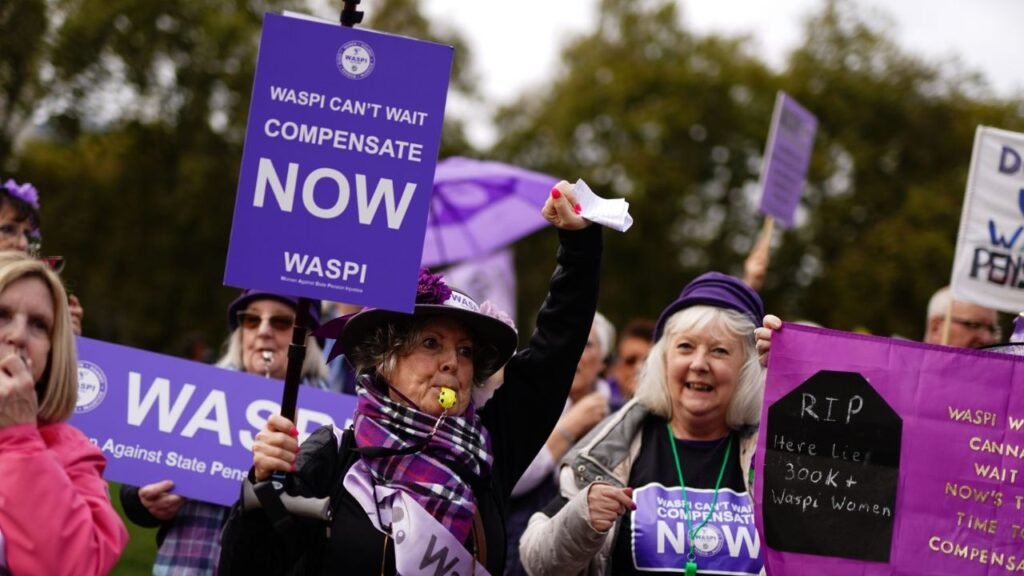The campaign by Women Against State Pension Inequality (WASPI) continues to dominate discussions in 2025. Millions of women born in the 1950s were affected by the gradual rise of the State Pension age. While the Parliamentary Ombudsman recommended compensation up to £2,950, the UK Government has yet to approve a formal scheme. This article explains the current situation, potential payouts, and what to expect for 2025 and beyond.
Origins of the WASPI Campaign
WASPI was formed to highlight the sudden changes to the State Pension age, which increased from 60 to 66 for women born in the 1950s. The movement argues that insufficient notice prevented many women from adequately preparing financially and emotionally. The Parliamentary and Health Service Ombudsman (PHSO) confirmed in 2024 that the DWP failed to communicate effectively, causing hardship for millions. The £2,950 figure represents the maximum Level 4 compensation recommended, but it is not guaranteed.
Government Response and Political Landscape

The Government has not implemented any compensation scheme, citing administrative complexity and potential costs of £10-12 billion. More than 200 MPs have expressed support for a formal scheme, and the All-Party Parliamentary Group on WASPI continues to lobby for action. Despite public pressure, no payments have been confirmed for 2025, and the matter remains under parliamentary scrutiny.
Key 2025 Developments Influencing WASPI Compensation
- Legislative Attempt: A Private Member’s Bill seeks to establish a compensation framework in line with the Ombudsman’s recommendations. Approval could allow payments to begin by mid- or late-2026.
- Legal Proceedings: A High Court hearing scheduled for December 2025 may influence government and parliamentary decisions. While a court cannot compel payment directly, a favourable judgment could increase pressure for legislative action.
Understanding the £2,950 Compensation Recommendation
The £2,950 amount is the maximum suggested under the Ombudsman’s Level 4 category. Future schemes may adopt one of two models:
- Flat-rate system: Equal payment for all eligible women
- Tiered system: Payment varies depending on financial impact or hardship
- The PHSO estimates total costs could reach £7-10 billion, which remains the largest obstacle to implementing a scheme.
Potential Payment Scenarios for WASPI Women
| Scenario | Preconditions | Earliest Payment | Likelihood (Oct 2025) |
|---|---|---|---|
| Government Legislation Enacted | Parliamentary approval of compensation bill | Mid-Late 2026 | Moderate |
| Post-Court Policy Review | Government reconsideration after legal judgment | Late 2026-Early 2027 | Possible |
| Status Quo Maintained | No legislative action or funding | No payments | High |
How a Future Scheme Could Work
If approved, compensation is likely to follow a structured process:
- Identification of Beneficiaries: The DWP would use National Insurance records to locate eligible women
- Payment Assessment: Compensation calculated based on pre-defined criteria
- Oversight and Appeals: A dedicated body could verify claims and handle disputes
- Distribution: Payments likely made in batches through secure digital channels
Timeline Indicators for Payment
Important milestones that could influence compensation include court hearings, parliamentary debates, and potential legislation in 2026. Payment rollout would depend on legislative approval and system readiness.
Primary Obstacles to Progress
Two main factors continue to prevent compensation from being delivered:
- Lack of legislative approval by Parliament
- Budget constraints, as Treasury estimates show total costs could exceed £10 billion
Avoiding Scams and Misinformation
Fraudulent websites falsely promise WASPI payments of £2,950 in 2025. The DWP urges women to rely only on official government sources, verified news outlets, or the WASPI campaign’s official communication channels.
As of October 2025, no WASPI compensation payments have been issued. While the £2,950 figure remains the recommended maximum, payments depend entirely on future government decisions and legislative approval. Women affected should monitor official sources and exercise caution to avoid scams.



